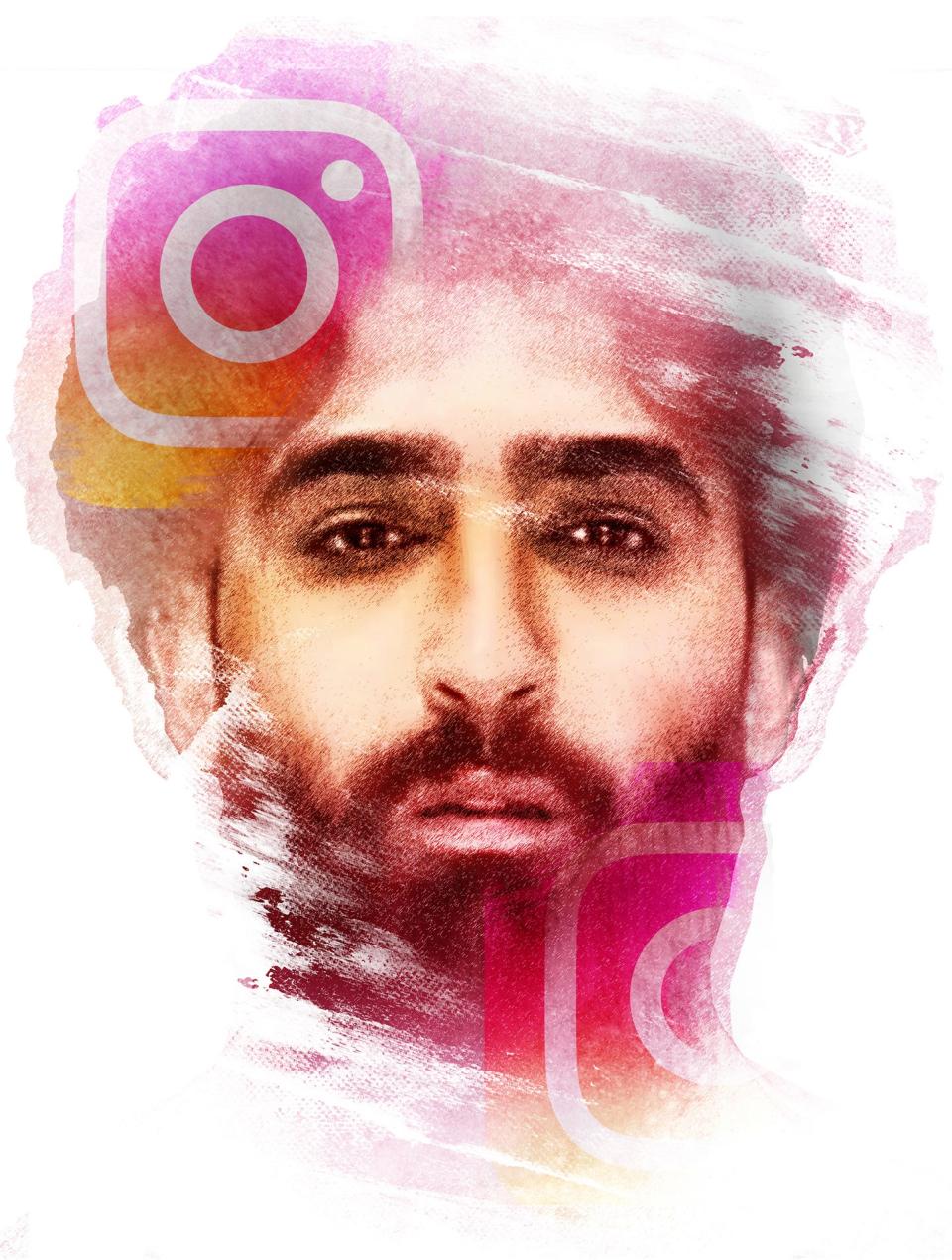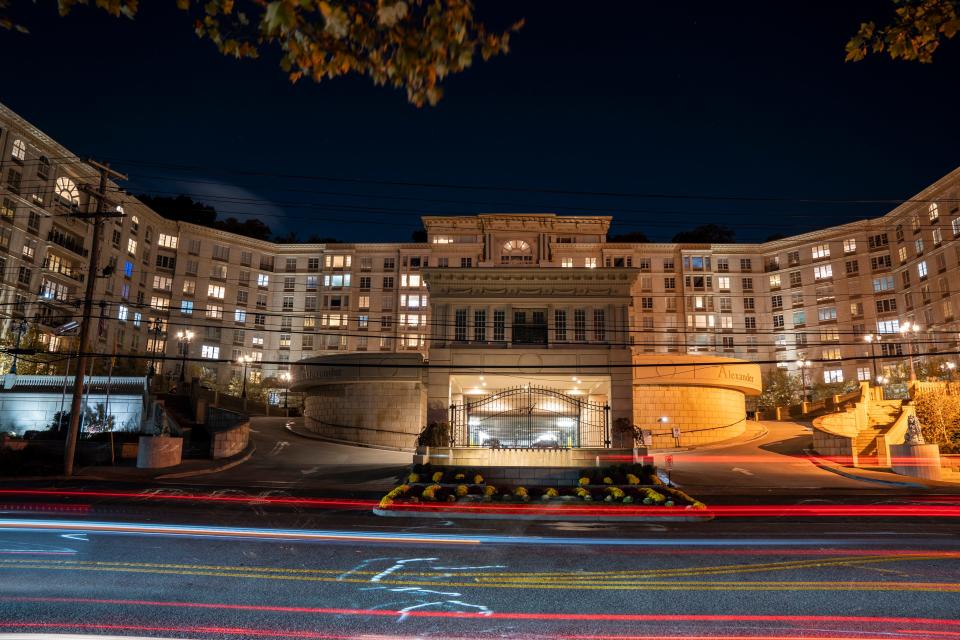Influencer Jay Mazini found fame on social media. Did he use that fame to swindle millions?
With his brand of street style and swagger, Instagram influencer Jay Mazini strolled up to the drive-thru window of a Burger King in Southside Jamaica, Queens, in New York City.
“How many people you guys got here?” he asked a worker. Ten, he found out. He asked for all of them to come to the window.
“How’s life treating you? How’s everything? They pay you all right?” he said to the employees on the night shift, who broke from their stations and crowded the window. “I’m just trying to pull up and show love to you guys. I know you guys work hard."

Then he reached into his pocket and pulled out stacks of cash, handing them one by one to each employee. “This is for you. This is for you. This is for you.” The crew started to scream.
“Hold up, hold up, hold up,” he said. “There’s more. One more thing.”
Then the workers erupted as the rapper 50 Cent strutted up to the window, smiling and giving out cash alongside Mazini. The hip-hop star draped his arm around Mazini’s shoulder and patted him on the belly.
The video, which was filmed on Sept. 8, 2020, and blew up on social media, was one of many showing Mazini giving out cash at fast-food restaurants, at Walmart and on the street. In other popular posts, he strolls the Islamic holy city of Mecca doling out spiritual guidance, preaching about lifting people up and rejecting materialism. Hip-hop stars Snoop Dogg, 50 Cent and Fabolous — who joined a cash giveaway at Checkers in Jersey City — shared his videos online.
“This is the man right here,” said 50 Cent, the rap icon behind the bestselling album “Get Rich or Die Tryin’.”
The videos catapulted Mazini to fame. Blending the hip-hop styling and witticisms of DJ Khaled and the expensive stunts of MrBeast — both social media icons — Mazini quickly gained a million Instagram followers. He spun this fame to grow his Mazini Italy clothing line, an online stock trading academy and a bitcoin buying spree — all of which came crashing down after buyers accused him of running scams.
Online followers claimed they paid for clothing and classes they didn’t receive. Others alleged they sent him bitcoin and got forged wire confirmations instead of payment. And his biggest investors included fellow Muslims who poured money into a financial scheme that one expert called the biggest Ponzi scam to ever hit a Muslim American community.
Mazini, feeling pressure and facing spiraling debts, began lashing at his critics in live Instagram videos and direct messages. And he blamed a former schoolmate, Amjad Mashal, for an Instagram page detailing his alleged schemes.
But what happened next shocked even Mazini’s toughest critics — and landed him in jail.
Influencer Jay Mazini’s rise: ‘From zero to a hundred’
NorthJersey.com and the USA TODAY Network New Jersey examined hundreds of pages of documents and interviewed about 20 acquaintances, community leaders, customers, investors and social media experts to understand how Mazini rose to fame and how he used his influence to carry out alleged and admitted schemes.
Reporting also included trial coverage and jailhouse interviews. In a few cases, sources wanted to keep their names private because of their closeness to Mazini's family or because of pending legal action.

Mazini, 27, whose real name is Jebara Igbara, was part of a crop of influencers who build their personal brand online and can shape fans’ decisions, from what they wear to how they spend their money. The influencer marketing industry worldwide is expected to grow to a $16.4 billion business this year, according to Influencer Marketing Hub, an online resource for influencers and the companies that use them.
On Instagram, Mazini’s followers were awed by his tale of turning $400 into millions, his luxury lifestyle and his access to hip-hop stars. They absorbed his religious and financial advice, even when it seemed too good be true.
“At the height of his fame, people were looking at him driving a Lamborghini and hanging out with 50 Cent,” said Feras Awwad, who grew up in the same tight-knit community in Clifton, New Jersey, as Mazini. “They said, ‘Look at this guy. He’s connected with a big shot.’ It legitimized him in people’s eyes.”
“He went from zero to a hundred out of nowhere,” he said.
Mazini’s rise didn’t start online. He began making money as a boy growing up in Clifton. At age 14, he was selling phones and cologne on the streets in the Bronx, he said in videos he posted online. His family ran successful clothing stores there, and he, too, had an eye for business, said former classmates and friends.
“He always seemed like he had something going on, and I don’t mean that in a shady way,” said a family friend who lives in Clifton. “He grew up in a family that really emphasized business and entrepreneurship.”
“He said you should never work for someone. You should be your own boss,” said the friend, who did not want to be identified because he is close to the family. “He was more fond of entrepreneurship than school."
Mazini said he was pulling in $1,400 to $1,500 weekly within a year. His earnings kept growing with business ventures and stock trading until, he said, he became a millionaire.
Then he started courting investors.
Jay Mazini fraud: Clothing, academy, bitcoin Ponzi scam
In 2016, he launched the Mazini Italy clothing brand in partnership with the rapper Dave East and opened a short-lived store at Westfield Garden State Plaza in Paramus, which, with its five malls, is the shopping capital of New Jersey.
Three years later, he launched the Mazini Academy — an online school where he would personally teach about stock trading and the foreign exchange market.
He later started Halal Capital, an investment company that he said would sell products considered halal, or permissible in Islamic teaching.
Last year, in his final business scheme, he offered to buy bitcoin at above market value from his online followers. He told interested investors that his net worth was $33 million, according to a court complaint.
Mazini’s status grew during the COVID pandemic, when he was handing out cash as people were struggling to pay bills, starting in the North Jersey communities where he lived, first in Clifton and later in Totowa, New Jersey. In April 2020, he stopped at a Checkers drive-thru on Market Street in Paterson, New Jersey, and thanked the late-night workers, who kept the burger place running during the pandemic. Then, he gave four workers $10,000 each.
“You guys are going through a tough time, like it’s a crisis,” he told them. “I just wanna show love. God bless you guys.”
Nigel Sampson, who was working at Checkers that night, told News12 he was thrilled, especially for his employees, whose work hours had been cut during the pandemic.
"I just want to say thank you, man, from me and my crew members," Sampson said. "There are a lot of people struggling, going through a lot of hardship right now because of the coronavirus. For him to be able to come out to change people’s days and lives with gestures like that, it really means a lot."
Ten days later, Mazini was outside St. Joseph’s University Medical Center in Paterson, then ravaged with COVID cases, giving away 10,000 medical masks. He said he wanted to spread positivity. Paterson Mayor Andre Sayegh, who was there, said Mazini inspired people during a tough time.
“To see the videos of him coming to Checkers and stopping at the drive-thru and giving thousands to those mostly making minimum wage — how can that not be captivating?” Sayegh said.
Social media bites back
Mazini presented a luxury lifestyle online, appearing with a Lamborghini Huracán and gold watches. He insisted it was not to show off, but rather, he said to motivate other young entrepreneurs to be successful.
“I didn’t do it for just the money,” Mazini said in a video explaining how he started with $400 and grew his wealth. “I wanted to pave the way for the youth, so they have could something to look up to. They can have hope. And say OK, he made it. If he could make it, I could make it."
“It’s not only about materialist things and man-made currency,” he added. “It’s about resonating with another person.”
Young people idolized him. In South Paterson, the heart of North Jersey’s Arab community, they were wearing Mazini-brand sweatshirts and caps and listening to his talks on faith and business.
“There was a perception that this was a super successful person and part of the community,” said Salaheddin Mustafa, head of outreach at a Paterson mosque where Mazini sometimes worshipped. “Why wouldn’t that be attractive? Most people give people benefit of the doubt that what they are doing is legit.”
Some invested with him, but others were skeptical. In interviews, several people said his religious persona appeared hollow and that his cash giveaways were at best for show, or at worst that he was giving away other people’s money.
“We used to joke about it. He would say I’m not materialistic and I don’t like showing off," said the family friend from Clifton. "I think his actions reflected otherwise.”
But if anyone knocked Mazini online, saying he didn’t pay them back or deliver clothing they purchased, he would argue fiercely or block them.
As the criticism began to pile up, even Mazini and his close associates couldn’t get a handle on it.
Pressure building, his cool demeanor began to crack. In a live Instagram months before his arrest, Mazini sat in the dark shouting at people who left comments accusing him of running scams.
“Scammin’ how? Scammin’ how?” yelled Mazini. “I gave millions away, man. I didn’t have to give nothing away. Why? Because I didn’t give you something. So get up and work … Damn, bro, always looking for a handout ... I don’t own nobody nothing. I’m giving away money for free.”
Then he shared a message: The next hundred people who enrolled in his Mazini Academy would get $30,000 each. The class cost $800.
It was a typical Mazini offer: high-stakes giveaways and promotions to lure people to hand over money for his ventures.
Jay Mazini scam: A fierce feud
But people were talking, saying he sent bad checks and fake wire transfer confirmations. Investors from his community were calling and showing up at his family’s house demanding payment.
Mohammed Musa, a Staten Island investor, hammered Mazini in online videos over his schemes, inviting guests to share their own experiences. An early investor with Halal Capital, Musa said in a lawsuit that he and his family lost $3.3 million.
Popular YouTuber Stephen Findeisen, known as Coffeezilla, also had a series of popular videos describing Mazini’s alleged schemes and mocking his far-fetched promises to give away huge sums of money to randomly selected customers.
Mazini was especially furious about an anonymous “Jay Mazini Scam” page on Instagram that was topping search results about him and was loaded with anonymous complaints. He believed Amjad Mashal ran the page.
Mashal and Mazini had known each other since they attended an Islamic school in Union City. Later, Mashal printed shirts for Mazini’s clothing business, and they tussled over payments and deadlines, Mashal said. But their beef was more personal than business, and it escalated into a fierce feud.
In Instagram videos, Mashal called Mazini and his family members crooks and insulted his wife and her female cousin. Despite their feuding, Mashal described their relationship as a “friendly rivalry.”
In March 2021, Mazini asked to meet for coffee to talk it out. They met outside The Alexander, a luxury apartment building in Edgewater with statues of lions mounted out front and skyline views of Manhattan. Mazini had moved there with his wife after leaving his family’s home in Totowa.

Mashal said in an interview that he “sensed something wrong,” but agreed to get in Mazini’s white Range Rover.
When they got to the 7-Eleven in Cliffside Park, the door opened and two men got in with hoods drawn up, medical masks covering their face.
“He said ‘Just relax. We’re not going to hurt you,'” Mashal recalled. “'We just want to see what’s on your phone.'”
He did not think Mazini would become violent.
But that night, sitting in the Range Rover, he began to panic.
This article originally appeared on USA TODAY: Who is Jay Mazini? Social media influencer turned Bitcoin scammer

